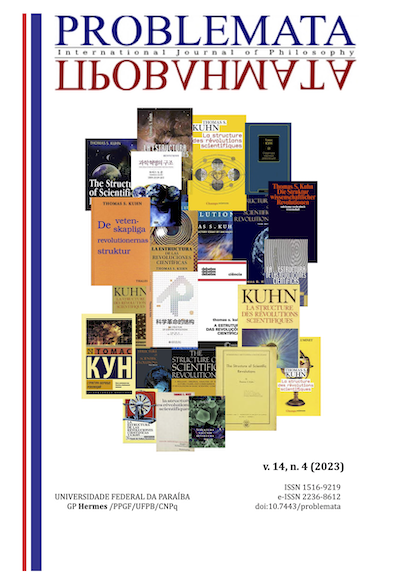THOMAS KUHN:
SCIENCE, HISTORY AND THE SCIENTIFIC COMMUNITY
DOI:
https://doi.org/10.7443/problemata.v14i4.67757Keywords:
Kuhn, science, paradigm, scientific community, historyAbstract
This dossier, dedicated to the Thomas Kuhn's philosophy, was conceived after the "Thomas Kuhn Colloquium: Science, History and the Scientific Community", promoted in partnership by the Graduate Programs in Philosophy at the Universidade Federal do Piauí (PPGFIL/UFPI) and Interdisciplinary in Applied Human and Social Sciences at the Universidade Estadual de Campinas (ICHSA/Unicamp), held at the School of Applied Sciences of Unicamp, in Limeira (SP), on September 29 and 30, 2022. This special issue is part of the celebrations for the 100th anniversary of the birth of the American philosopher, who marked philosophy, the history of science and various areas of knowledge with the concept of "paradigm" and the thesis of incommensurability.
Downloads
References
KUHN, Thomas S. A estrutura das revoluções científicas. São Paulo: Editora Perspectiva, 2000.
KUHN, Thomas S. A tensão essencial: estudos selecionados sobre tradição e mudança científica. São Paulo: Editora Unesp, 2011.
Downloads
Published
Issue
Section
License
Copyright (c) 2023 Gustavo Silvano Batista, Eduardo Marandola Junior

This work is licensed under a Creative Commons Attribution 4.0 International License.
Authors who publish with this journal agree to the following terms:
- Authors retain copyright and grant the journal right of first publication with the work simultaneously licensed under a Creative Commons Attribution License that allows others to share the work with an acknowledgement of the work's authorship and initial publication in this journal.
- Authors are able to enter into separate, additional contractual arrangements for the non-exclusive distribution of the journal's published version of the work (e.g., post it to an institutional repository or publish it in a book), with an acknowledgement of its initial publication in this journal.
-
- Authors are permitted and encouraged to post their work online (e.g., in institutional repositories or on their website) prior to and during the submission process, as it can lead to productive exchanges, as well as earlier and greater citation of published work (See The Effect of Open Access).





